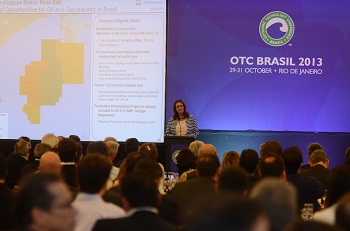“Our understanding is that we can do a lot, but we can´t do it alone. Petrobras needs partners”, Petrobras CEO Graça Foster says.
Mrs. Foster was the guest of honor during a luncheon on the opening day of OTC Brasil 2013, and “Planning and management of offshore oil opportunities in Brazil: The Petrobras Perspective” was the title of her presentation. Maria das Graças Silva Foster has been the CEO of Petrobras sine February 2012. She also a member of the board of IBP, which is one of the organizers of OTC Brasil.
 Looking even further ahead, Mrs. Foster said that Petrobras’ strategic choices for the future also depend on the global oil production. She expects oil prices to fall in the years to come, but as demand increases, she foresees that the prices will later recuperate. Photo courtesy of OTC Brasil 2013.Today, Petrobras produces 2 million barrels of oil per day, but by 2020, the aim is to double the production. According to Graça Foster, this is already happening and will become reality. Mrs. Foster presented several impressive numbers to the audience:
Looking even further ahead, Mrs. Foster said that Petrobras’ strategic choices for the future also depend on the global oil production. She expects oil prices to fall in the years to come, but as demand increases, she foresees that the prices will later recuperate. Photo courtesy of OTC Brasil 2013.Today, Petrobras produces 2 million barrels of oil per day, but by 2020, the aim is to double the production. According to Graça Foster, this is already happening and will become reality. Mrs. Foster presented several impressive numbers to the audience:
From 2007-2012, 62 percent of the big discoveries in the world, was made in Brazil, and discoveries were made in all the 13 wells drilled in pre-salt areas this last year. This gives Petrobras proven reserves and a potential recoverable volume of 31,5 billions boeds.
Need partners
The importance of cooperating was something Mrs. Foster mentioned on several occasions during her presentation.
“In the 11th bidding rounds, we entered into partnerships with several important partners. The Espirito Santo basin is an example. For the first time we did not insist on being operator of the fields. Our understanding is that we can do a lot, but we can’t do it alone. To comply with deadlines and keep costs low, we need our partners and we need to diversify our operations”, she said.
Graça Foster describes the Brazilian regulatory system as clear, although the industry needs to relate to 3 different regulatory frameworks – the concession agreements, the production sharing agreements and the transfer of rights agreement.
“Our system pleases a majority and dissatisfies a minority. It’s not ambiguous, and there is room for the production sharing agreement”, she said, dismissing the criticism voiced by unions, nationalists and Brazilian press the last weeks.
“To Petrobras, the Libra round was extremely well-timed, and we are teaming up with companies that can teach us a lot, and together we’ll work to have the first oil by 2020”, she continued.
Gaps
Mrs. Foster also talked about the capacity in the local supply industry and the shipyards in Brazil, and gave several examples of drill ships and rigs delivered on time with a high local content. One example is the semi-submersible P-55, with a local content of 77 percent, built by IESA and the Rio Grande shipyard. P-55 will operate on the Roncador field and produce 180.000 barrels of oil per day. First oil is expected in December 2013.
The local content regulations are something Brazil needs, but Graça Foster makes it clear that Petrobras also needs shipyards and suppliers abroad.
“The local content regulations have to be well managed. We need the foreigners, without them, we are faced with an equation without solution”.
She is however satisfied with the work being done by Brazilian shipyards, and once again, she talked about the importance of strategic partnerships.
“We still have a lot to learn, and the shipyards currently have 28 drill ships under construction. More contracts will be closed. Petrobras completely depend on these rigs and ships if we are to reach the objective to double our production by 2020. But the shipyards are delivering on time, and we see that many international companies are establishing in Brazil and teaming up with the local shipyards. This has been vital to Petrobras. You have to have an international partner who has proven its competence abroad. Brazilians alone cannot succeed alone, maybe later, but not at this point, and to Petrobras, the risk is high. These are companies that have constructed rigs and drill ships for us abroad earlier, and we have no prejudice against foreigners. When a barrel of oil costs 100 dollars, you can’t have prejudice.”
By Runa Hestmann Tierno, NBCC journalist
(runa.tierno@nbcc.com.br)
Photo courtesy of OTC Brasil 2013
:


